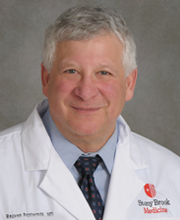 With the first case of Ebola in New York City, it is understandable that Long Islanders have heightened concern of it becoming more widespread.
With the first case of Ebola in New York City, it is understandable that Long Islanders have heightened concern of it becoming more widespread.
At Stony Brook Medicine, we have been working diligently to ensure that the hospital and its outpatient sites have the capability to safely evaluate and care for a patient who is suspected to have Ebola — without contaminating our employees, other patients or our community.
Our prevention protocols go above and beyond those recommended by the U.S. Centers for Disease Control and Prevention (CDC), and extensive drills and training exercises have been conducted with employees who are both in direct or indirect patient contact. As part of these preparedness efforts, Stony Brook Medicine has trained staff in key areas on how to wear and remove personal protective equipment.
Stony Brook Medicine is one of eight hospitals in New York State to be designated as a regional resource to serve public health needs during the threat of the Ebola virus. As Suffolk County’s only university-based medical center, it is our responsibility to be prepared always for any type of potential crisis so that we can protect the communities we serve.
These preparations include the creation of a Task Force led by our Chief Medical Officer, Joseph Laver, MD, and Director of Emergency Preparedness, Leo DeBobes, and experts in emergency medicine, critical care, infectious disease, pathology, general medicine and pediatrics, and epidemiology. To ensure a coordinated effort, we are in constant communication with the State and County Departments of Health, the CDC and other regional agencies.
While we are ready to care for a potential patient with Ebola, the risk of getting Ebola remains quite low for the average person. For those of you looking for a way to help, you can. Because the symptoms of Ebola and the flu are quite similar, you can follow this advice: get a flu shot. This will help lessen the number of people who are worried that their fever or fatigue could be Ebola.
One of the best responses to this outbreak is the call for a renewed commitment to the health of others worldwide. With the arrival of Ebola in the U.S., people deeply understand how our individual health can be impacted by global health.
For information about Ebola transmission, the latest guidelines and Stony Brook’s preparedness efforts, visit Stony Brook University’s Ebola Virus Information website.
L. Reuven Pasternak, MD
Chief Executive Officer, Stony Brook University Hospital
Vice President for Health Systems, Stony Brook Medicine

